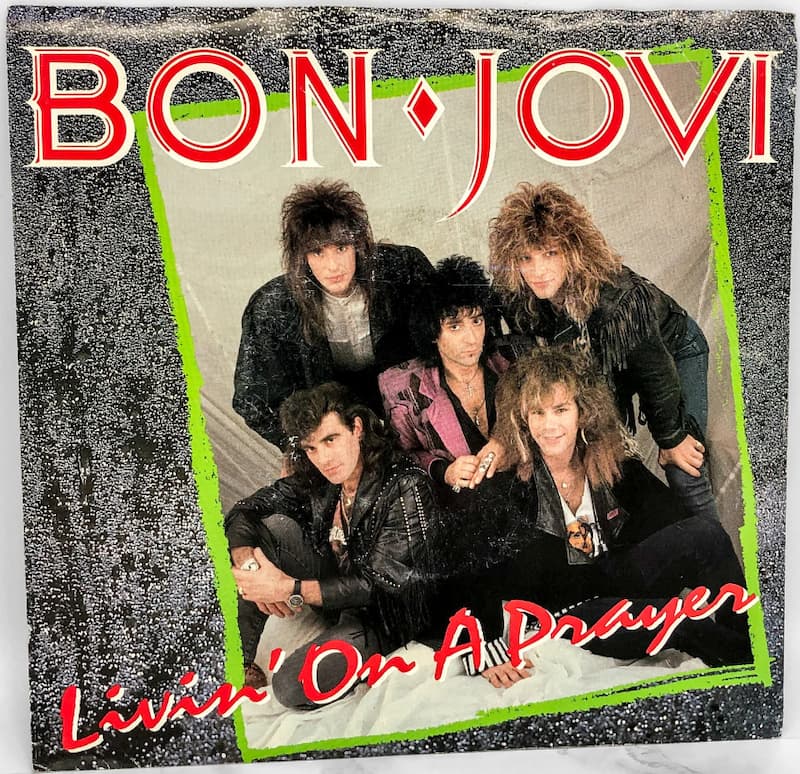
Bon Jovi emerged from humble beginnings in New Jersey to become one of the most iconic rock bands of the 1980s and beyond. The original lineup—lead singer Jon Bon Jovi, guitarist and co-songwriter Richie Sambora, bassist Alec John Such, keyboardist David Bryan, and drummer Tico Torres—laid the foundations for a global phenomenon that would change rock music forever.
Their journey began with their self-titled debut album in 1984, featuring the Top 40 hit “Runaway,” followed by their 1985 release 7800° Fahrenheit. Both albums earned Platinum certification, but it was their 1986 breakthrough album, Slippery When Wet, that catapulted the band to superstardom. The record dominated Billboard’s 200 chart, holding the No. 1 spot for eight weeks, and achieved the rare honor of a Diamond certification.
This album is home to three enduring anthems: “Wanted Dead or Alive,” “You Give Love a Bad Name,” and most notably, “Livin’ On A Prayer.” This song became a defining motivational anthem, capturing the economic struggles of the working class in the 1980s. It tells the story of Tommy and Gina, a fictional couple clinging to hope and faith amid hardship.
Interestingly, the band initially doubted the song’s potential. Jon Bon Jovi once recalled to The Irish Times,
“I remember walking out of the room with Richie and I said, ‘Eh, it’s okay. Maybe we should just put it on a movie soundtrack.’ Richie looked at me and said, ‘You’re an idiot. It’s really good.’ I said, ‘I just don’t know where it’s going.’ But it didn’t have that boom-boom-boom bassline yet, so it sounded more like The Clash.”
The original demo, included as a hidden track in their 2004 box set 100,000,000 Bon Jovi Fans Can’t Be Wrong, reflects a much moodier and less explosive style—lacking the iconic pounding drums, electrifying guitars, and Richie Sambora’s signature talkbox effect that transformed the song into the classic it is today.
Co-songwriter Desmond Child, who also penned major hits like Joan Jett & the Blackhearts’ “I Hate Myself for Loving You” and Aerosmith’s “Dude (Looks Like a Lady),” recounted in a 2019 podcast:
“We had sort of written it like this spooky, moody, sensitive thing. Jon didn’t think it was going to be right for the direction that they were going into, which was like, hard rock, stadium rock. The song was so good that Richie Sambora and I literally got on our hands and knees, half-joking, half-serious, and begged him to record it.”
Their persistence paid off. The final version of “Livin’ On A Prayer” exploded onto the scene, powered by heavy rotations of its music video, directed by Wayne Isham, on MTV. The song went on to become Bon Jovi’s second consecutive No. 1 single, following “You Give Love A Bad Name.” The band made history as the first hard rock act to top the Hot 100 chart with back-to-back singles.
Beyond chart success, the song has left a lasting impact on American culture. After the September 11 attacks, Bon Jovi delivered a memorable acoustic performance of “Livin’ On A Prayer” on the America: A Tribute to Heroes special. When the COVID-19 pandemic swept the globe, Jon Bon Jovi joined a city-wide singalong in Chicago, uniting fans through the song’s timeless message of perseverance.
The track has continued to inspire other artists. Rihanna famously joined Bon Jovi for a live rendition during a 2010 Madrid concert and later covered the song on The Ellen DeGeneres Show in 2016. Michelle Williams also offered her version on The Masked Singer in 2019.
Bon Jovi sustained their success long after “Livin’ On A Prayer.” They secured five more No. 1 albums, staged a triumphant comeback with their 2000 album Crush—including the empowering hit “It’s My Life,” which nods to the enduring spirit of Tommy and Gina. The songwriting duo of Jon Bon Jovi and Richie Sambora was honored with induction into the Songwriters Hall of Fame in 2009, and the band earned a well-deserved place in the Rock and Roll Hall of Fame in 2018.
Solidifying their legacy as rock legends, Bon Jovi owes much of their lasting fame to the unforgettable spirit and resilience epitomized in “Livin’ On A Prayer,” a song that continues to electrify audiences worldwide and blows the roof off stadiums across generations.